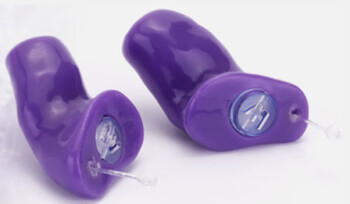Did your ears ever ring after you played a gig, and not stop for a day or two? Now imagine that same scenario, but the ringing never stops. Pretty scary, right? And that's not an uncommon circumstance. Ringing in your ears, which is called "tinnitus," is only one of the occupational issues musicians face from repeated exposure to high sound pressure levels.
Danger zone
If you’re exposed to volume levels above 85 dB for prolonged periods of time, you’re putting your hearing at risk. Unfortunately, an average rock band with drums is somewhere in the upper 90 dB range, or higher. According to the Centers for Disease Control, a “loud rock concert” is about 105 dB. Volume levels at nightclubs are also extremely high, so DJs face the threat of hearing loss, too.
The reason the danger is greater for musicians and DJs than it is for music fans is that damage comes from repeated exposure over time. So the more and longer you’re exposed to 85+ dB sound pressure levels, the more likely you are to sustain damage. The worst part of it is, there is no way to cure hearing loss, or to get rid of tinnitus. Once the damage is done, you have to live with it.
Plugging away
If you want to safeguard your hearing, you need to wear hearing protection, which, unless you’re lucky enough to be in a band with an in-ear monitor system, means wearing ear plugs. Ear plugs are very effective at reducing sound pressure levels. But not all plugs are alike. In fact, there’s a huge variation, and as a musician, you won’t be happy or comfortable with just any old earplug.
Standard foam earplugs, the kind you can get at your local drugstore, are inexpensive and give you hefty attenuation levels in the neighborhood of 30 dB SPL. Sounds perfect right? Well, not exactly. They may be sufficient if you’re operating heavy machinery, but as a musician, you don’t want your hearing to be attenuated most heavily in the upper mid and high frequencies, which is what foam earplugs do. Everything sounds muffled, it’s harder to perceive pitch. As the old saying goes, it’s like showering with a raincoat.
As a result, musicians who try foam ear plugs usually give up on them quickly. Fortunately, there are better alternatives. There are a number of manufacturers that make generic, “universal fit” earplugs for musicians. These are designed to provide a more flat attenuation. The advantage of such plugs is that they’re not super expensive; they range between $10 to $50 a pair, depending on brand and model. Some work better than others, but all will give you a flatter frequency response than foam plugs.
A good universal-fit option is Etymotic Research’s ER-20 plugs, which list for $13.99 a pair. Etymotic has been at the forefront of developing musician-friendly earplugs. There are many other brands of universal fit musician’s plugs on the market. Do a search on Google for “musician’s earplugs” to find more choices.
|
Westone’s TRU plugs are custom-fit models that can be outfitted with -10, –12, –20 or –25 dB filters
|
Etymotics Music Pro earplugs ($299/pair), are by far the most expensive universal fit plugs, but they’re also the most sophisticated. They feature active electronics and offer “adaptive noise reduction, ” which only attenuates when sound levels exceed safe levels. They give you either 9 dB or 15 dB of reduction, depending on whether they’re in passive or active mode, and automatically protect against sudden loud sounds. The downside is that the active electronics require batteries. They’re standard hearing aid batteries, which are relatively inexpensive, but you have to replace them every 3 weeks or so. These plugs also stick out a bit from your ears, so are not as discrete as some others.
One size doesn’t necessarily fit all
Custom-fit ear plugs are another option. They are more expensive, because they’re custom made, based on a foam impression that’s taken of your ear canal. They cost in the neighborhood of $200 a pair, but they offer a more even attenuation than most universal fit plugs. You can get custom models that attenuate different amounts, typically somewhere between 9 and 25 dB, depending on your needs. Brands like Etymotic Research and Westone are leaders in this area.
On the baseline
If you’ve been playing in bands or otherwise exposing your ears to potentially damaging sound levels, it’s a good idea to get hearing checked by a certified audiologist as soon as is convenient. Why? Even if you think your hearing has not suffered any damage yet, it’s important to establish a baseline for it, which your audiologist can use for comparison when you get tested in the future. What’s more, if you already have some hearing damage, that will get picked up as well.
Now hear this!
No matter what type of earplugs you use, it’s likely to take you some time to adjust to them, so don’t give up after one gig. It makes sense to start with universal fit musician ear plugs, since they’re mainly less expensive, and see if you get results you can live with. If not, try a higher-end solution like the custom plugs or Etymotic’s Music Pro plugs.
Even if you don’t play live, there are hearing dangers in the studio, as well. Headphones or earphones (both studio and personal) can generate damaging sound pressure levels, as can studio monitors. Unlike at a show, you have control of the overall volume in your studio, so be cognizant to keep monitors and headphones at reasonable levels. Remember, once your ears are damaged, there’s no way to restore them. Don’t wait until it’s too late to start protecting your ears. Do it today.

